Health Benefits of Vitamin B Shots for Cats
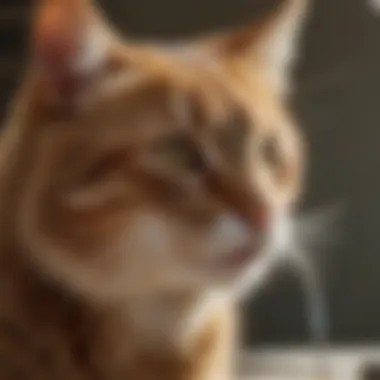

Intro
Vitamin B shots for cats represent a significant component in ensuring feline health and well-being. These injections contain essential nutrients that can greatly impact a cat's overall vitality. Understanding the necessity, benefits, and administration of Vitamin B shots is crucial for cat owners and veterinary professionals alike. By examining these aspects, we can appreciate why these interventions become vital in certain situations and how they can enhance a cat’s quality of life.
Topic Overview
Vitamin B refers to a group of water-soluble vitamins that play important roles in cell metabolism. Key vitamins in this group include B1 (thiamine), B2 (riboflavin), B3 (niacin), B5 (pantothenic acid), B6 (pyridoxine), B7 (biotin), B9 (folate), and B12 (cobalamin). All these vitamins are crucial for various physiological functions in cats.
Definition of Key Terms
- Vitamin B Complex: A group of vitamins that are involved in energy production, metabolism, and brain function.
- Hypovitaminosis: A deficiency in vitamins that can lead to serious health issues.
- Intramuscular Injection: A method of delivering medications directly into a muscle to allow for quick absorption.
Relevance in Agriculture, Horticulture, and Agronomy
Although primarily focused on feline health, the relevance of Vitamin B extends into agriculture and animal husbandry. Cats, often found on farms, require proper nutrition to maintain health, which is vital for disease prevention and productivity within this setting. Ensuring that animals receive the necessary vitamins and minerals directly contributes to the efficiency and sustainability of agricultural operations.
Current Trends and Innovations
The landscape of veterinary care is continually evolving, leading to innovative approaches for administering nutrients to pets. Recent advancements include:
- Improved Formulations: Enhanced Vitamin B shots are now available, offering better absorption rates and longer-lasting effects.
- Combination Therapies: New veterinary practices now often combine B vitamin injections with other supportive treatments to address specific health issues.
Recent Advancements in the Field
Researchers continuously explore the effects of Vitamin B supplementation on conditions such as anemia and neurological disorders in cats. Clinical studies have shown promising results in improving certain ailments, highlighting the importance of ongoing research.
Emerging Technologies and Practices
- Veterinary Telemedicine: This allows pet owners to consult with veterinarians about the best Vitamin B supplementation practices without physical visits.
- Bioavailability Studies: Ongoing research aims to improve the formulations of Vitamin B shots, ensuring higher bioavailability for cats.
Practical Applications
To effectively use Vitamin B shots, it is essential to understand the proper administration methods and safety measures. Here is a step-by-step guide:
Step-by-Step Guides or How-Tos
- Consult a Veterinarian: Always consult a vet to determine if your cat requires Vitamin B supplementation.
- Choose Appropriate Vitamin B Formulation: Select the right shot based on your cat's specific needs.
- Follow Dosage Guidelines: Adhere to the veterinarian's recommendations regarding dosage.
- Administer the Injection Properly: Use appropriate techniques to minimize discomfort.
- Monitor for Reactions: After administration, observe your cat for any adverse reactions.
Tips and Best Practices for Implementation
- Always store Vitamin B shots in a cool, dry place.
- Keep records of all administered doses to avoid accidental overdoses.
- Rotate injection sites to prevent tissue damage.
Vitamin B shots can substantially influence a cat's health trajectory, especially when integrated into a comprehensive care plan supervised by veterinary professionals. By understanding the benefits, proper administration, and potential risks, cat owners can make informed decisions that promote the well-being of their pets.
Understanding Vitamin B Complex
Understanding the Vitamin B complex is essential for cat owners and professionals alike. It encompasses a range of eight distinct vitamins, each serving unique roles within the feline body. These vitamins play critical roles in various bodily functions, including metabolism, energy production, and maintaining optimal health. When evaluating the necessity of vitamin B supplementation via shots, recognizing these distinct vitamins can guide informed decisions and enhance the overall well-being of cats.
Types of Vitamin B
Various types of Vitamin B exist, each known for their specific properties and benefits. Below are the vitamins in this complex, including their roles and advantages for cats.
Vitamin B1 (Thiamine)
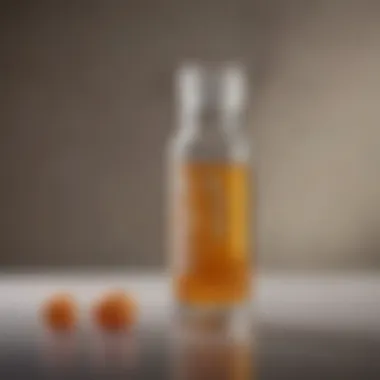
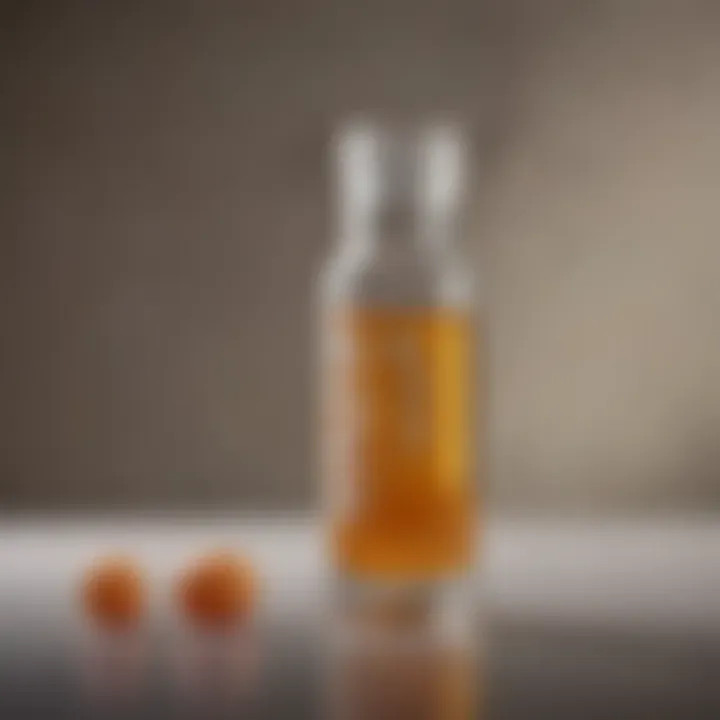
Vitamin B1, or Thiamine, is crucial for energy metabolism. It helps convert carbohydrates into energy, vital for an active feline life. Thiamine is particularly important in preventing neurological disorders. However, cats are prone to deficiency, especially in cases of poor diet. A shortage can lead to serious health issues, emphasizing the need for adequate intake.
Vitamin B2 (Riboflavin)
Vitamin B2, or Riboflavin, is integral for energy production and the metabolism of fats, proteins, and carbohydrates. It's also known for its antioxidant properties, which can protect cells from damage. Riboflavin is significant in promoting healthy skin and coat, making it a beneficial choice for cats with skin issues. Its unique feature lies in its solubility in water, which means excess amounts are easily eliminated through urine, reducing overdose risks.
Vitamin B3 (Niacin)
Vitamin B3, known as Niacin, is vital for energy metabolism and synthesizing fatty acids. Cats need niacin, which can help maintain a healthy appetite and support healthy skin. The unique aspect of Niacin is its conversion from tryptophan, an amino acid. If dietary protein is low, cats can develop a deficiency affecting their health.
Vitamin B5 (Pantothenic Acid)
Pantothenic Acid, or Vitamin B5, plays a fundamental role in energy production and synthesizing fatty acids. It is also involved in hormone synthesis. Despite its importance, cats tend to synthesize B5 efficiently, making deficiencies rare. However, when needed, supplementation can assist in supporting energy levels, particularly for active or stressed cats.
Vitamin B6 (Pyridoxine)
Vitamin B6, or Pyridoxine, assists in protein metabolism and neurotransmitter synthesis. It helps maintain overall health by influencing mood and behavior. Pyridoxine is another vitamin cats can struggle to produce, especially during times of stress or illness. Its supportive role in the nervous system makes it particularly valuable in promoting mental and emotional balance in pets.
Vitamin B7 (Biotin)
Biotin is widely recognized for its role in maintaining healthy skin and coat. It supports keratin formation, which is a crucial protein for fur and skin. While cats generally synthesize Biotin, supplementation can ensure optimal health, especially in those with skin conditions. This unique feature sets it apart as a popular choice for cats experiencing dermatological problems.
Vitamin B9 (Folate)
Folate, or Vitamin B9, is essential for DNA synthesis and red blood cell formation. It plays an important role in cellular growth, making it significant for young cats. Despite being abundant in various foods, deficiencies occur in some conditions. Supplementing can enhance overall health and support recovery from illness, making it very relevant for certain populations of cats.
Vitamin B12 (Cobalamin)
Vitamin B12, or Cobalamin, is critical for neurological function and DNA synthesis. It aids in maintaining healthy nerve cells and is crucial in red blood cell production. Cats who have digestive issues may have trouble absorbing B12, leading to deficiencies. Supplementation can provide essential support, especially for those who are experiencing gastrointestinal disorders.
"The Vitamin B complex plays an indispensable role in your cat's health and well-being. Individual vitamins address specific needs that enhance overall quality of life."
In summary, understanding the complexities of Vitamin B is key for ensuring the health of cats, paving the way for proper supplementation when required.
The Importance of Vitamin B for Cats
Vitamin B plays a crucial role in maintaining overall feline health. Each type of vitamin B contributes to various bodily functions, which makes them essential for cats. Adequate levels of vitamin B are vital not just for physical well-being, but also for energy production and metabolic processes. Cats, being obligate carnivores, require specific nutrients to thrive, and vitamin B is among them.
A deficiency in any of these vitamins can manifest in a variety of health issues, leading to severe conditions if left unaddressed. Thus, ensuring that cats receive sufficient vitamin B is a matter of not only nutrition but also health management. Moreover, understanding the need for vitamin B can aid in quicker recovery from illnesses and surgeries.
Role in Metabolism
Vitamin B complex is fundamental in metabolic functions, which involve converting food into energy. Specifically, vitamins like B1 (thiamine) and B2 (riboflavin) are crucial for this energetic conversion. If a cat does not get enough of these vitamins, it may experience lethargy or loss of appetite. When their metabolism is impaired due to deficiencies, cats cannot effectively utilize their food intake, leading to weight loss or malnutrition.
Impact on Nervous System Health
The B vitamins have significant implications for nervous system health. Vitamins such as B6 (pyridoxine) and B12 (cobalamin) support the production of neurotransmitters and the maintenance of myelin sheaths around nerves. Deficiencies can lead to neurological issues in cats, such as tremors, seizures, and coordination problems. Maintaining an adequate supply of these vitamins is essential for optimal brain function and an overall stable mood in feline companions.
Influence on Skin and Coat Condition
A healthy coat and skin are often indicators of a cat's well-being. Vitamin B plays a vital role here, particularly B7 (biotin) and B5 (pantothenic acid), which contribute to skin health and fur quality. A deficiency in these vitamins can lead to symptoms such as dry, flaky skin and poor coat texture. Regular intake of vitamin B may support rich fur and healthy skin, enhancing both appearance and comfort.
A balanced intake of vitamin B is essential for proper growth and maintenance of feline health. It is important for energy, nervous system function, and skin health, highlighting the need for constant monitoring and supplementation where necessary.
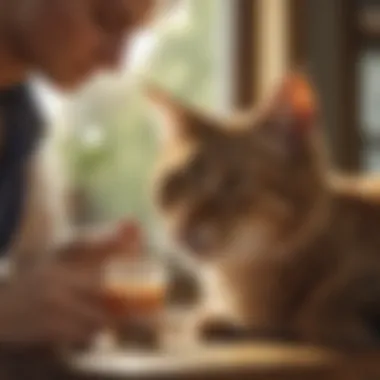
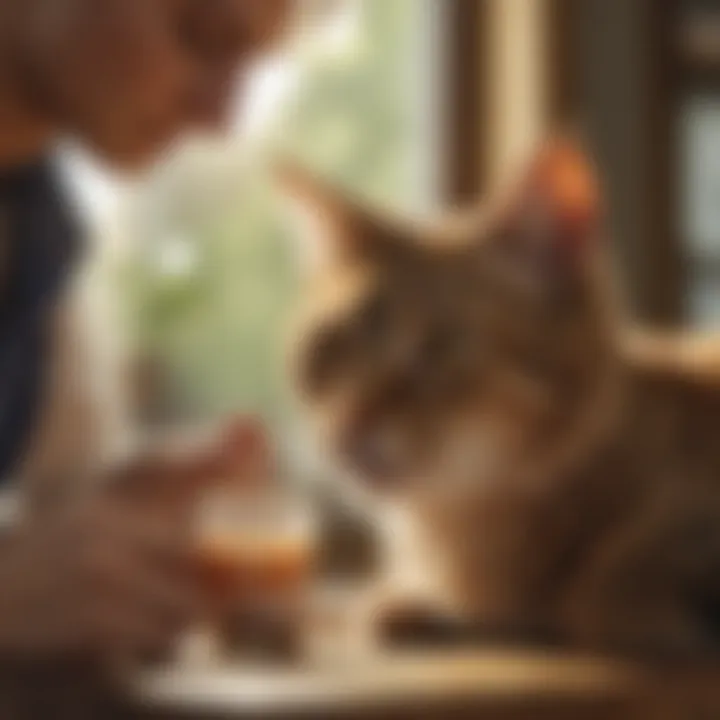
Considering all these aspects, vitamin B shots can serve as an effective solution when oral supplementation is insufficient or impractical. Careful attention to dietary sources and veterinary guidance is essential in addressing vitamin B deficiencies.
Indications for Vitamin B Shots
Vitamin B shots can play a crucial role in the health management of cats. Identifying the right indications for these injections is essential for ensuring the well-being and recovery of feline companions. This section will delve into various conditions that justify the need for vitamin B supplementation through shots. By understanding these indications, cat owners and veterinary professionals can make informed decisions, leading to improved health outcomes for cats in need.
Nutritional Deficiencies
Cats can suffer from nutritional deficiencies due to various factors, such as poor diet, malabsorption diseases, or increased nutritional demands. For instance, vitamin B deficiencies can lead to a range of health issues, including anemia, neurological disorders, and skin problems. Cats that are fed low-quality food may not get sufficient vitamins needed for optimal health. Often, mere dietary adjustments are insufficient to rectify these deficiencies rapidly. This is where vitamin B shots become significant. They provide a direct and effective means to deliver essential nutrients quickly, alleviating deficiencies and restoring health.
Recovery from Illness or Surgery
Recovery periods after illness or surgery can be taxing on a cat's body. During these times, their nutritional needs may increase significantly. Vitamin B plays a vital role in supporting metabolism and overall recovery. For example, vitamin B12 (Cobalamin) is particularly important for cats recovering from gastrointestinal diseases or major surgery. Administering vitamin B shots postoperatively or during recovery from illness can help speed up healing, improve appetite, and support energy levels. This ensures the cat regains strength more quickly, which is essential for a successful recovery.
Chronic Conditions Requiring Supplementation
Some cats suffer from chronic conditions that warrant ongoing vitamin B supplementation. Conditions such as kidney disease or inflammatory bowel disease (IBD) often impede nutrient absorption or increase the cat’s need for these vitamins. Regular vitamin B shots can provide a level of consistency in nutrient delivery that oral supplements may not achieve. Additionally, certain medications can deplete vitamin B levels, making shots a targeted and efficient alternative to support ongoing health. Monitoring these conditions alongside regular vitamin B supplementation is essential for maintaining a cat’s quality of life.
Regularly assessing your cat’s health conditions can make a significant difference. Consult your veterinarian to determine if vitamin B shots are necessary.
Administration of Vitamin B Shots
Understanding how to administer Vitamin B shots properly is essential for ensuring the health and well-being of cats. This section focuses on veterinary guidelines, dosage recommendations, and the methods of administration. Each of these elements plays a significant role in the effective use of Vitamin B injections, allowing for optimal health benefits while minimizing risks.
Veterinary Guidelines
Before administering any Vitamin B shots, it is crucial to consult with a veterinarian. They will assess the individual needs of the cat, considering factors such as age, health status, and specific deficiencies. Following their guidelines ensures that the intervention is safe and appropriate. Veterinarians often recommend routine blood work to monitor levels of Vitamin B before proceeding with injections.
Dosage Recommendations
Proper dosage is paramount when it comes to administering Vitamin B shots. The veterinarian typically prescribes the exact amount based on the cat’s body weight and overall health. For instance, an average adult cat may receive doses of Vitamin B12 ranging from 100 micrograms to 500 micrograms. Regular monitoring can lead to adjustments if necessary. Accurate dosage helps reduce the risk of overdose while ensuring that the cat receives the required nutrients for improvement in health.
Methods of Administration
Intramuscular Injection
Intramuscular injection is a common method for administering Vitamin B shots. This technique involves injecting the vitamin directly into the muscle, which allows for a rapid absorption into the bloodstream. One significant advantage of intramuscular injections is the ability to deliver a larger volume of fluid compared to other methods. It often provides a quicker response in terms of symptom relief for vitamin deficiencies. However, this method may be less preferable for those who are concerned about causing discomfort to their cat at the injection site.
Subcutaneous Injection
Subcutaneous injection involves injecting Vitamin B under the skin rather than into the muscle. This method is less invasive, making it a popular choice for both pet owners and veterinarians. A key characteristic of subcutaneous injections is the ease of administration, as it can often be done at home with proper training. The unique feature of subcutaneous administration is that it allows for slower absorption of the vitamin, extending its benefits over a longer period. Although it might take a bit longer to achieve the desired health effects, it generally is well tolerated by cats.
"Administering Vitamin B shots requires careful consideration of techniques and guidance from a veterinarian to optimize health benefits for your cat."
In summary, when administering Vitamin B shots, it is essential to consider veterinary advice, adhere to proper dosage, and choose between intramuscular and subcutaneous injection methods based on individual needs. By following these guidelines, cat owners can ensure an effective supplementation approach that promotes feline health.
Potential Risks and Side Effects
Understanding the potential risks and side effects of vitamin B shots for cats is essential. While these injections can provide significant health benefits, they are not without their drawbacks. Recognizing these risks allows pet owners and veterinarians to make informed decisions regarding the administration of vitamin B supplements.
Potential adverse effects can vary in type and severity. These may range from mild reactions to more serious complications. Therefore, a thorough understanding is necessary.
Allergic Reactions
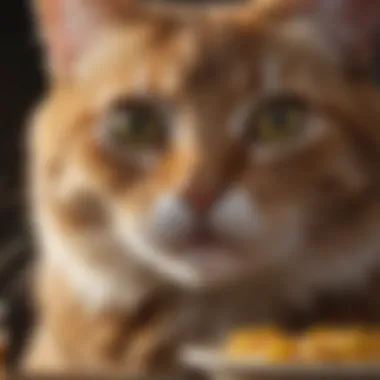

Allergic reactions are one possible risk associated with vitamin B injections in cats. Though rare, they can occur. Symptoms might include swelling, difficulty breathing, or gastrointestinal distress. If a cat has a known allergy to any component of the vitamin B formulation, the risks increase.
It’s crucial for pet owners to monitor their cats closely after an injection. If any signs of an allergic reaction appear, seek immediate veterinary assistance.
Injection Site Reactions
Injection site reactions commonly occur after vitamin B shots. These may manifest as redness, swelling, or discomfort at the injection site. Although they are typically mild, they can cause concern for some cat owners. In most cases, these reactions resolve on their own without the need for treatment.
To minimize such reactions, veterinarians typically follow specific protocols during administration. Techniques such as using a clean needle and careful injection can help reduce local irritation.
Overdosage Issues
Overdosage of vitamin B can lead to various health issues. While vitamin B is water-soluble and excess amounts are usually excreted in urine, high doses can still pose risks. Symptoms of overdose might include lethargy, vomiting, or diarrhea. In the most severe cases, it may lead to neurological issues.
It’s vital to adhere to veterinary guidance on dosages to prevent such complications. Monitoring your cat's response to the vitamin shots can also provide insight into whether the current dosage is appropriate.
Alternative Sources of Vitamin B
Alternative sources of Vitamin B are crucial for maintaining the overall health of cats. While vitamin B shots provide a direct and effective method for supplementation, it is essential to consider dietary and supplemental alternatives that ensure cats receive adequate nutrition. These sources not only support the immune system and metabolic functions but also help in preventing deficiencies that can lead to serious health issues. Incorporating a variety of dietary sources and making informed choices about supplements can significantly enhance a cat’s health profile.
Dietary Sources
Cats are obligate carnivores, which means their diet primarily consists of animal-derived products. Many foods naturally contain vitamin B, making them valuable for any cat's dietary plan. Some important dietary sources include:
- Fish: Rich in several types of vitamin B, particularly B12, which is essential for nerve function and blood cell production.
- Meat: Red meats like beef and lamb offer a wealth of B vitamins, including B3 and B6, that play roles in energy metabolism and skin health.
- Poultry: Chicken and turkey are good sources of B vitamins as well, making them excellent additions to a feline diet.
- Eggs: Eggs contain biotin (B7) and riboflavin (B2), both of which contribute to energy metabolism and overall health.
- Organ meats: Liver, in particular, is rich in vitamins B6, B12, and folate, essential for various bodily functions.
Feeding a balanced diet that includes these foods can help achieve adequate vitamin B levels in cats. However, it’s crucial to ensure that the diet is well-balanced and meets all nutritional needs.
Supplement Options
In cases where dietary intake may not be sufficient, particularly due to illness, recovery, or specific health conditions, supplements may be required. These can include:
- Vitamin B complex capsules: These provide a range of B vitamins in a single pill. They can easily be mixed with food or given directly.
- Liquid supplements: These offer a convenient way to administer the necessary vitamins. They can be added to water or food without fuss.
- Chewable tablets: Many cats enjoy flavored tablets. This method can be effective for pet owners who find it challenging to administer pills to their cats.
- Fortified cat food: Some commercial cat foods are specifically fortified with additional vitamins and minerals, providing a balanced alternative for cats that may require more support.
When considering supplements, it is vital to consult with a veterinarian to determine the appropriate type and dosage. This ensures both safety and efficacy in correcting any deficiencies.
"A balanced diet is fundamental for a cat's health, but understanding alternative supplement options can offer peace of mind for cat owners."
In summary, ensuring adequate vitamin B intake through both dietary and supplemental sources is critical for cats’ health. By exploring these alternatives, owners can promote better health outcomes and enhance their cats' quality of life.
Finale and Recommendations
In the exploration of vitamin B shots for cats, it becomes evident that understanding and addressing feline health is critical. The benefits of vitamin B supplementation can significantly improve the overall well-being of cats, especially in cases of deficiency or recovery from illness. However, responsible administration is paramount.
Consulting Your Veterinarian
Before proceeding with vitamin B shots, consultations with a veterinarian are essential. The vet can evaluate your cat's specific health needs and determine the necessity of supplementation. This professional advice can prevent potential overdosage and negative interactions with other medications.
Veterinarians will conduct thorough examinations to identify signs of deficiency. They may suggest blood tests to assess vitamin levels. It is crucial to communicate any changes in your cat's behavior, diet, or health. This information helps the vet create a tailored plan.
Moreover, the veterinarian will guide the administration process. They can teach cat owners the right techniques for administering injections if necessary.
Monitoring Your Cat’s Health
After starting vitamin B supplementation, continuous monitoring of your cat's health is vital. Observe your cat for any noticeable changes in behavior, appetite, and energy levels. Keeping a journal can help track these changes effectively.
Regular follow-up consultations with the veterinarian should be scheduled. During these consultations, adjustments to dosages can be made based on the cat's response to the shots. This proactive approach can ensure ongoing optimal health for the feline.
This commitment to monitoring and adjusting care is essential in achieving the desired health outcomes of vitamin B supplementation. By diligently following these recommendations, pet owners can significantly contribute to their cat's health and quality of life.



